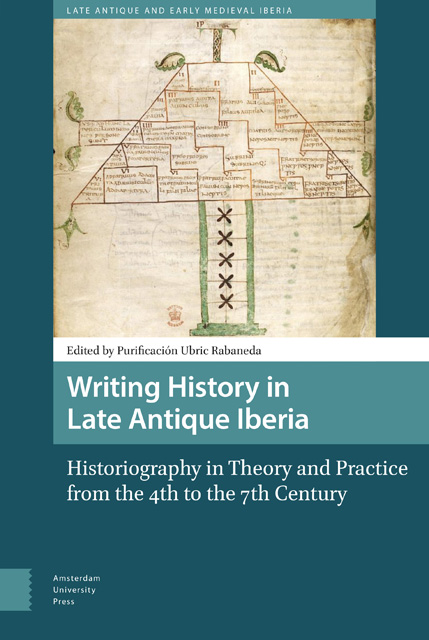 Writing History in Late Antique Iberia
Writing History in Late Antique Iberia Published online by Cambridge University Press: 18 April 2023
Abstract
One of the characteristics of Christian historiography in Late Roman Hispania was the triumph of Christianity over every form of pagan tradition. The construction of a solid ideology aiming at establishing a clear demarcation between orthodoxy and heterodoxy was the necessary condition to check and neutralise expressions of religious dissent. This phenomenon becomes particularly evident not only when one examines norms and decrees issued by the ecclesiastical hierarchy, but also when considering a series of imperial constitutions directed against heretics and pagans. This contribution emphasises the importance of some aspects of Christian historiography in Late Roman Hispania, paying special attention to the increased number of ecclesiastical documentary sources which modern scholarship has analysed over the past few decades.
Keywords: Orthodoxy, Historiography, Late Roman Hispania, Heresy
As historians have rightly suggested, the religious freedom granted by the Edict of Milan in 313 allowed for a fundamental change in status for Christianity. Inasmuch as the Church was no longer regarded an illegal ‘sect’, Christianity became free to expand its influence within the Empire, gradually supplanting paganism and becoming the customary religion. Towards the end of the fourth century – during the reign of Theodosius – the Edict of Thessalonica in 380 and the Council of Constantinople in 382 imposed Nicene Christianity as the ‘state religion’. These events led to a major change in perspective. After this time, the spiritual superiority of Christianity over paganism and the suppression of pagan traditions are key elements in our understanding of Christian historiography. Drawing clear lines of demarcation between orthodoxy and heterodoxy almost immediately became a necessary condition to neutralise both manifestations of religious dissidence and expressions of diversity. This paper will examine two fundamental parameters that were commonly regarded as indicators of orthodoxy: coherence of behaviour and knowledge of doctrine. These concepts only emerged gradually though, and were adapted to the historical circumstances from time to time. Norms and decrees issued by the ecclesiastical hierarchy and constitutions promulgated by emperors are important sources from which to detect and analyse provisions directed against heretics and pagans. The examination of the situation in Hispania, most notably during the last decades of the fourth century, provides an interesting picture of both this cultural transition and the conflicts it caused.
To save this book to your Kindle, first ensure [email protected] is added to your Approved Personal Document E-mail List under your Personal Document Settings on the Manage Your Content and Devices page of your Amazon account. Then enter the ‘name’ part of your Kindle email address below. Find out more about saving to your Kindle.
Note you can select to save to either the @free.kindle.com or @kindle.com variations. ‘@free.kindle.com’ emails are free but can only be saved to your device when it is connected to wi-fi. ‘@kindle.com’ emails can be delivered even when you are not connected to wi-fi, but note that service fees apply.
Find out more about the Kindle Personal Document Service.
To save content items to your account, please confirm that you agree to abide by our usage policies. If this is the first time you use this feature, you will be asked to authorise Cambridge Core to connect with your account. Find out more about saving content to Dropbox.
To save content items to your account, please confirm that you agree to abide by our usage policies. If this is the first time you use this feature, you will be asked to authorise Cambridge Core to connect with your account. Find out more about saving content to Google Drive.